📞 1-888-293-0284
Don't Let Your Future Be Left To Chance - Secure Its Success By Mastering AI Grant Writing Machine Today!
Produce award-winning grants in ⚡️ lightning speed with ease.
AI Grant Writing Machine
Things Will Never Be The Same... Get on the training or keep doing the same and FOREVER be left behind!
Let's face the facts. In most cases, you compete when applying for grants. Either you win, or you lose. This depends on several factors, including how well you present your proposal, your agency's capacity to deliver on what you propose, and if you are a good match with the funder's mission.
But another factor that has rapidly come into the equation is your ability to produce winning grant proposals most effectively and efficiently quickly.
Unfortunately, many nonprofits and government agencies still write grant applications and proposals the old way. This means they are plowing the field with a shovel and donkey to get ahead when their competition uses modern farming technology and tractors to plow 60 + acres in a day!
Which do you want to be?
The person plowing with a single donkey or driving a tractor doing 30, 60, or 90 times the work.
AI has disrupted the game for grant writers and placed some on the field with mules and others in the driver's seat, moving at lightning speed!
The AI Grant Writing Machine is here to help you! This powerful training enables you to take our award-winning Grant Writing Success Formula and integrate it using AI in your grant development efforts.
Many mistakenly believe this is only useful for grant writing.
Our training shows you 20 ways to skillfully incorporate AI into every aspect of your grant writing efforts, all while saving time and energy and producing superior results.
Here's how you'll benefit...
- Discover 5 AI technologies you should have been using years ago that cost you time, money, and extra energy right now because you are not using them!
- Learn the ways 7 common mistakes to avoid when using artificial intelligence in grant writing that could be the kiss of death to your grant application.
- Gain a proven strategy for cutting your grant writing time in half or more (definitely more) by using three little-known tricks used only by the pros - This could be the difference between getting funded or losing again!
- Access the Grant Writing Success Formula - AI Grant Writing Machine Strategy to run circles around your competition to produce grants faster, better, and more often than those without this special knowledge.
- Discover 20 + ways to incorporate AI into your grant writing efforts that are overlooked by those already using AI in grant writing... Trust me, you just don't know what you don't know.
- See first hand how too much reliance on AI can cause your grant application to sink faster than the Titanic, with embarrassing results for you and your agency.
- Grasp the AI Grant Writing Secret of the Year that no one is talking about that will skip you from the back of the line to the front of the line when applying for grants -- This is one secret that is worth the price of admission!!
- Be among the first to arrive at the AI grant writing Gold Rush by learning 10 Proven Ways to outpace your competition and win more funding.
- Unearth 3 less obvious ways you should exploit AI to your advantage that would make your competitors envious and furious if they knew you were using them to win more grants.
- Learn 12 ways to make AI your Grant Writing Research Einstein and have more authoritative grant proposals than anyone else applying for the same grant... your competition will hate me for sharing this!
- Obtain my coveted 25 AI - Grant Writing Command Cheat Sheet... this is a major time saver you'll thank me for later!!!
- Discover the two proven secrets to improving any grant proposal with the help of AI. Now you can turn your losing grant proposal into a winner.
- Plus, much, much more!!!
You might as well go flush $25,000.00 or more in the toilet if you miss this training because it will cost you a lot more in time, effort, and efficiency, and you will lose grant money that could be yours. I urge you to do the only intelligent thing and sign-up now and pray your competition doesn't see this before you, or you may be on the wrong side of the fence, scratching your head and wondering what just happened!
It is one thing to know you are losing by not using AI.
Knowing how to exploit AI positively to its MAXIMUM potential is another thing.
This training is unlike any other on the market because it is taught by a grant professional and marketing expert who has been secretly using AI for years. I'm revealing my strategies because the general public has recently become aware of AI.
If you want to give your grant efforts the boost it deserves, sign-up now and get ready to win faster with less effort. Think of this as adding five staff members to your team for less than what you would pay for half a month's salary to an average worker.
Truthfully, it's worth a lot more.
Sign-up NOW!
P.S. Don't miss out because this price will only remain this low for a while... I already have a date when this price will go to its regular price of $4997.
Tired of struggling through grant applications? Get the help you need with our award-winning AI training to make writing them a breeze! With quick and easy access, get ready for success in your grantseeking endeavors.
Tips on Writing Grants with AI: A Modern Approach to Funding Successful Grant Proposals
In the ever-evolving landscape of technology, artificial intelligence (AI) has emerged as a game-changer across various sectors, and grant writing is no exception. Gone are the days when grant writing was all about manually sifting through countless funding opportunities, crafting proposals from scratch, and dealing with tedious paperwork. Today, AI is revolutionizing this traditional approach, promising a more efficient, strategic, and successful path to a grant proposal outlines securing funding. In this blog post, we will delve into how AI is reshaping the world of grant writing, the advantages it brings, the challenges it may pose, and its potential for the future. Welcome to a modern approach to funding successful grant proposals – powered by AI.
How is AI transforming the traditional approach to grant writing?
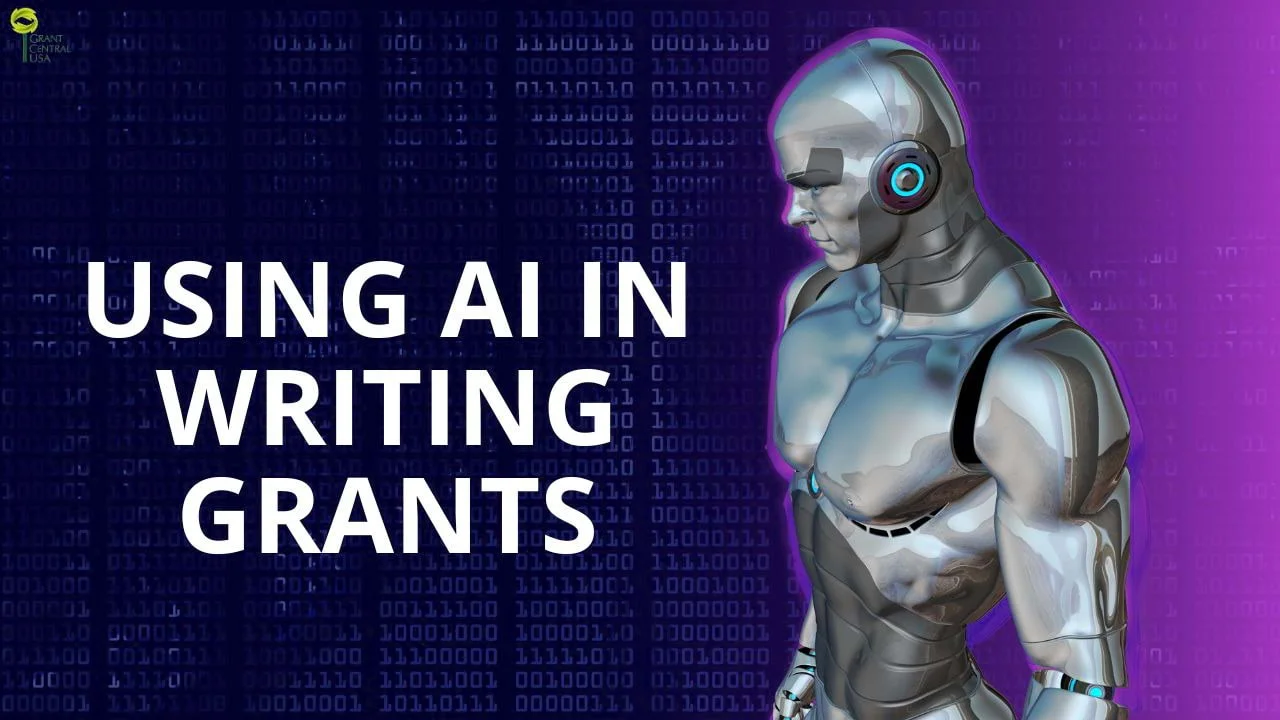
AI is transforming the traditional approach to grant writing in several ways. For starters, it's automating tasks and streamlining the process, which greatly improves efficiency. This means that grant writers can focus more on the strategic aspects of their work, and funding organization rather than getting bogged down in administrative duties.
Another significant change brought about by AI is its potential to improve accuracy. With machine learning algorithms, AI can analyze vast amounts of data and predict patterns with a high level of precision1. This ability can be particularly useful in identifying suitable funding opportunities and tailoring the best grant proposals to match specific criteria, thereby increasing the chances of success.
AI also offers benefits such as speed and scalability. It can quickly process large volumes of information, making it possible to manage multiple grant applications simultaneously. This is especially beneficial for small non-profits that often have lean teams and limited resources.
What are some examples of AI tools that aid in grant writing?
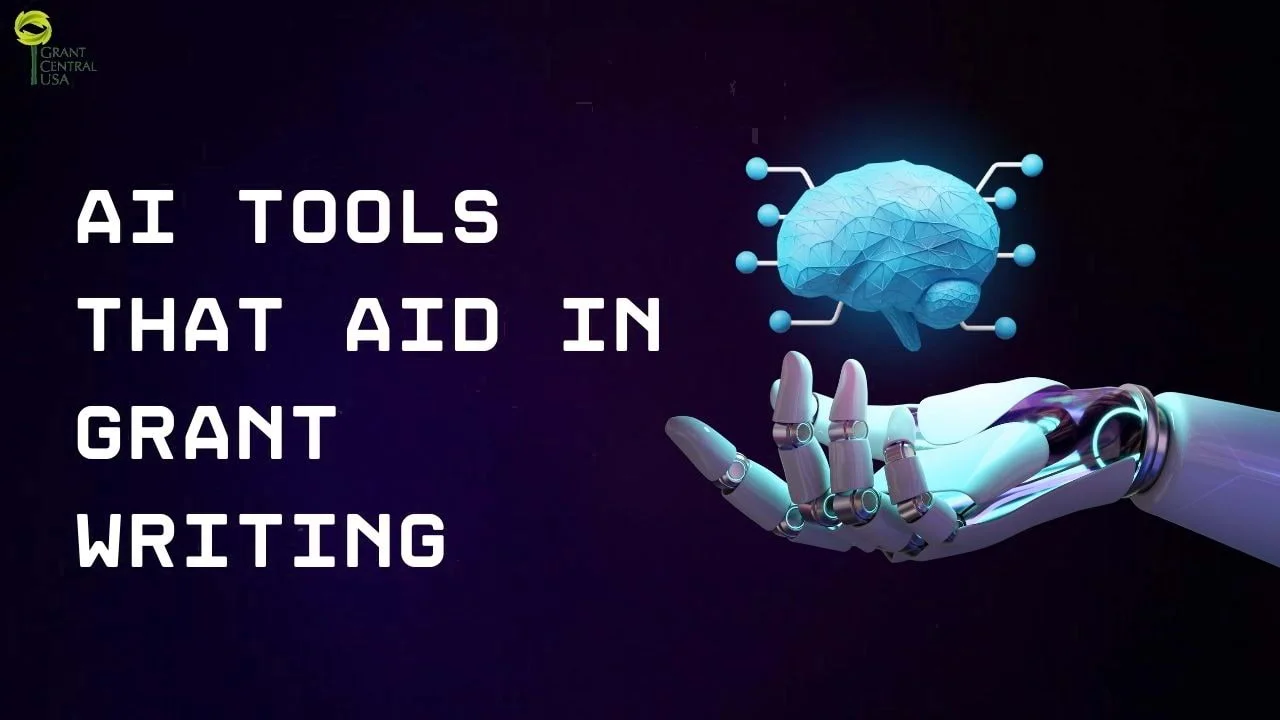
AI tools are playing a significant role in modernizing the grant writing process. By leveraging machine learning and natural language processing, these tools automate administrative tasks, improve accuracy, and help identify suitable funding opportunities. Here are some examples of AI tools that aid in effective grant proposal writing:
-
ChatGPT -
This tool uses machine learning to assist in creating grant proposals, letters of inquiry, and other grant-related content
-
Grantable -
Known as a leading AI-assisted grant writing solution, Grantable helps grant-seekers win more funding with less effort.
-
Fundwriter.ai -
This platform makes use of AI to assist grant writers in creating proposals by entering data into prepared fields.
-
Grant.io -
Another AI platform that can aid in writing effective grant proposal.
-
HyperWrite's Grant Proposal Generator -
An AI-powered tool that aids in transforming project ideas and specific goals into detailed and persuasive grant proposals.
-
Granted AI -
This AI tool is specifically trained for grant proposal writing and is said to produce superior outcomes compared to general-purpose AI writing tools.
-
Texta.ai's AI Writing Assistant -
This tool helps grant writers speed up the process of writing grants by automatically generating ready-made documents with accurate information.
These tools are revolutionizing the grant writing process, making it more efficient and effective for nonprofit organization.
How does AI improve the efficiency and effectiveness of grant writing?
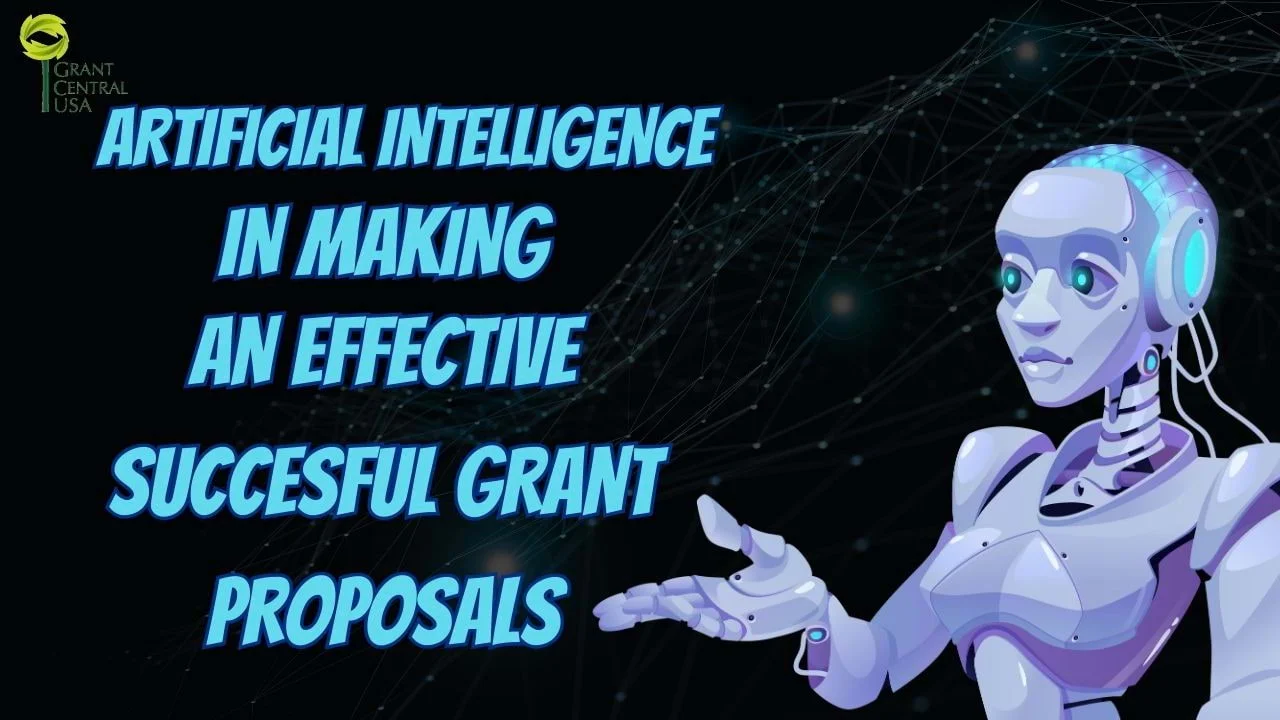
Artificial Intelligence (AI) is revolutionizing the efficiency and effectiveness of grant writing in several ways. Here are a few key aspects:
-
Automation of repetitive tasks:
AI can automate time-consuming tasks such as formatting, proofreading, and even initial drafting of grant proposals. This frees up valuable time for grant writers to focus on more strategic aspects of their work.
-
Enhancing proposal quality:
AI tools can analyze vast amounts of data and provide insights that help enhance the quality of grant proposals. They can highlight factors contributing to successful outcomes, thereby enabling grant writers to refine their strategies.
-
Optimizing proposals:
After a proposal has been written, AI can analyze its effectiveness and suggest ways to improve it. This includes identifying gaps in the narrative, checking for consistency, and ensuring that all the funder's requirements have been addressed.
-
Cost-effectiveness:
AI can reduce labor costs by automating content generation processes. This makes the grant writing process more cost-effective, especially for small organizations with limited resources.
-
Improving application screening:
For grantmakers, AI can automate the pre-screening process, saving time and resources. This allows staff to focus on more complex tasks, enhancing the overall efficiency of the grant program.
-
Improving the quality and efficiency of grant writing:
Both novice and experienced grant writers can leverage AI tools to improve the quality and efficiency of their grant writing.
While AI offers multiple benefits formal grant proposal, it's also important to remember that it is a tool to assist human grant writers, not replace them. The final touches, strategic decisions, and relationship-building aspects of grant writing still require the human touch.
How does AI assist in drafting more compelling and successful grant proposal?

AI is playing a pivotal role in enhancing the drafting of more compelling and successful grant proposals. Here's how:
-
Automating Routine Tasks:
AI can automate many of the routine tasks involved in writing a grant proposal, freeing up time for grant writers to focus on crafting a compelling narrative.
-
Improving Proposal Quality:
AI tools analyze large volumes of data and provide insights that can help enhance the quality of grant proposals. They can identify factors contributing to successful proposals, allowing grant writers to refine their strategies.
-
Optimizing Proposals:
AI can analyze grant proposals and suggest ways to improve them. This includes identifying gaps in the proposal, checking for consistency, and ensuring that all of the funder's requirements have been met.
-
Assisting in Drafting:
Some AI tools can assist in the initial drafting of grant proposals. These tools use machine learning algorithms to understand the context and generate relevant content, helping grant writers get started with their proposals.
-
Enhancing Engagement:
AI can help make grant proposals more engaging by suggesting the use of active voice and other writing techniques that can make the proposal more compelling to funders
-
Tailoring Proposals:
AI can help tailor proposals to match the unique objectives and target audience of each project. This ensures that the proposal resonates with the funder and increases the chances of successful grant proposal
-
Speed and Efficiency:
AI tools can process large volumes of information quickly, making it possible to manage multiple grant applications simultaneously. This increases the efficiency of the grant writing process
In conclusion, while AI can't replace the human touch needed in grant writing, it can significantly enhance the process for grant applicants by automating routine tasks, improving proposal quality, and providing valuable insights.
Are there any potential challenges or limitations in using AI for grant writing?
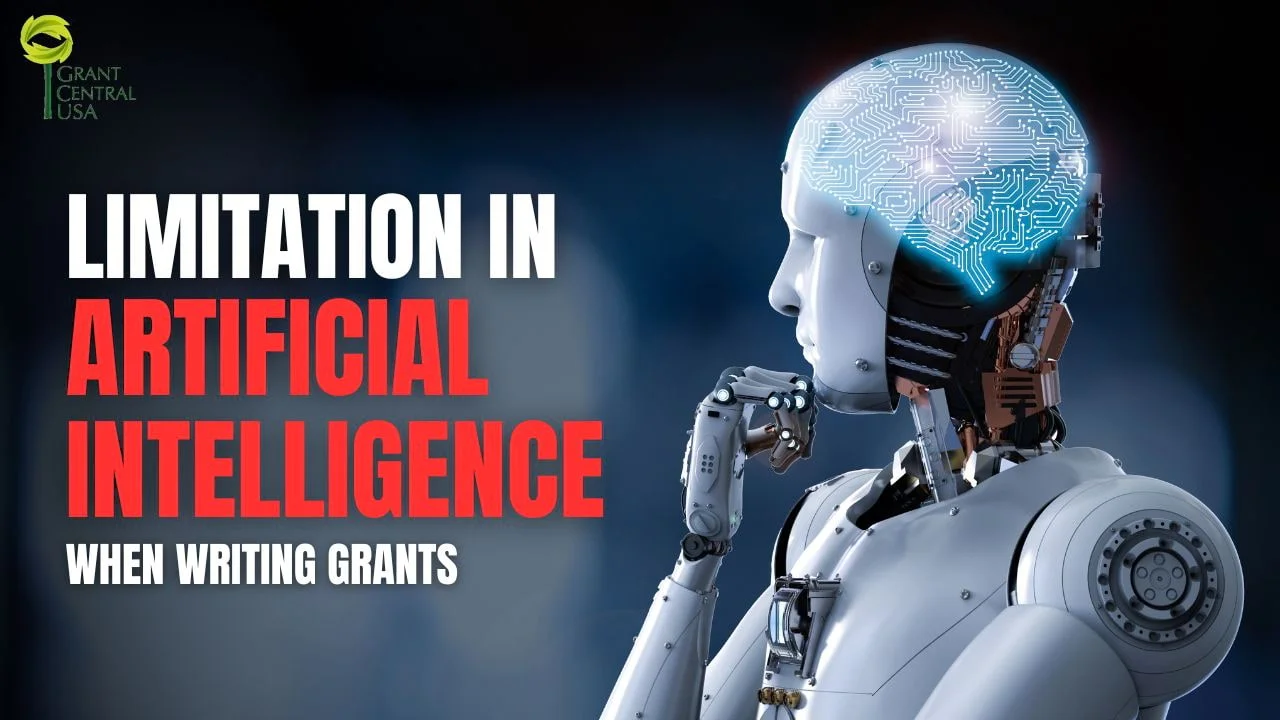
yes, there are several potential challenges and limitations in using AI for grant writing:
-
Lack of Organization: AI tools might not be able to organize content as effectively as a human writer, potentially leading to less coherent proposals.
-
Limited Content Creation: While AI can generate content based on predefined parameters, it might struggle with creating original and creative content that resonates with funders
-
Fact-Checking and Plagiarism Concerns: AI tools may inadvertently include inaccurate or plagiarized content in grant proposals, which could harm the credibility of the proposal.
-
Ethical Concerns: The use of AI in grant writing raises ethical issues, such as job displacement for human writers and potential bias in AI algorithms.
-
Learning Curve: Organizations might need to invest time and resources into learning how to effectively use AI tools for grant writing.
-
Domain-Specific Knowledge: AI tools might struggle with understanding and incorporating domain-specific knowledge or proprietary data into grant proposals.
-
Restrictions from Funding Organizations: Some funding organizations, like the NIH, have set restrictions on the use of AI platforms.
In conclusion, while AI can offer significant benefits in grant writing proposed project but, these potential challenges and limitations need to be carefully considered.
How can organizations ensure they're effectively utilizing AI in their grant writing efforts?
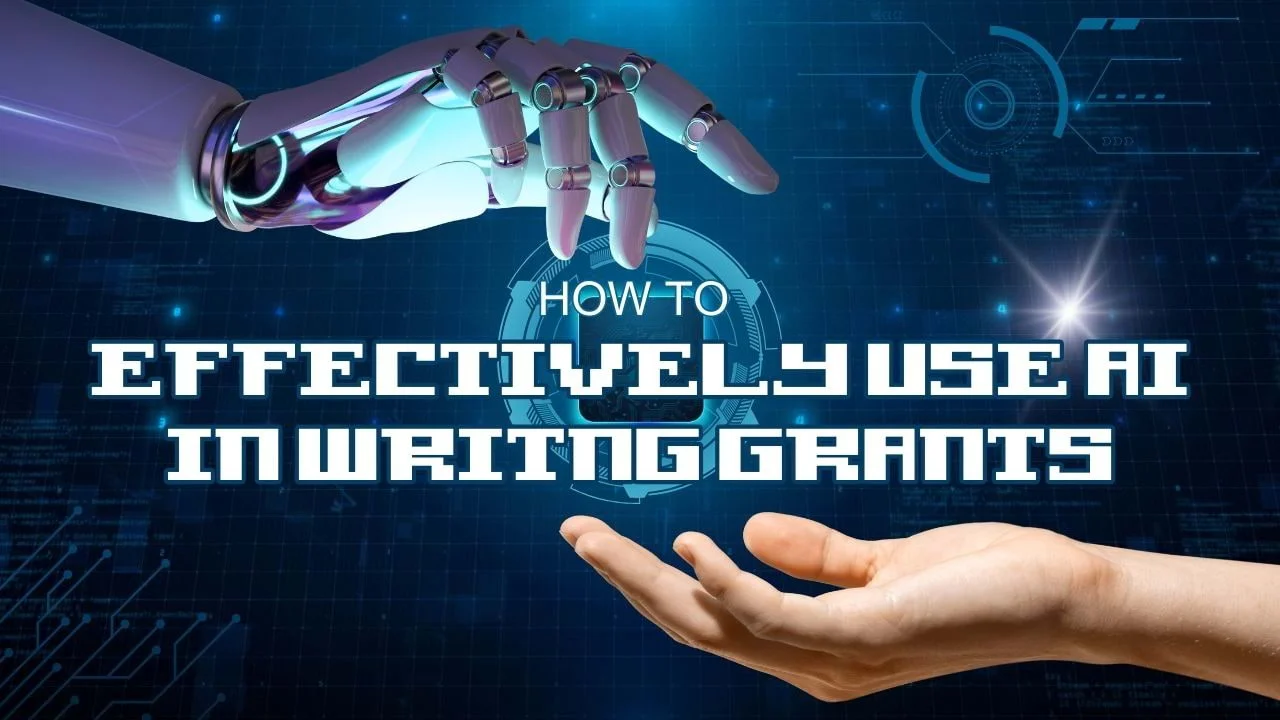
Organizations can effectively utilize AI in their grant writing efforts by implementing a few key strategies:
-
Leverage AI for Automation: Use AI tools to automate repetitive tasks such as data collection, formatting, and initial drafting of proposals. This enables grant writers to focus more on the strategic aspects of grant writing.
-
Use AI to Enhance Quality: AI tools can analyze vast amounts of data and provide insights that help enhance the quality of grant proposals. They can highlight factors contributing to successful outcomes, thereby enabling grant writers to refine their strategies.
-
Select Appropriate AI Tools: Choose AI tools that are specifically designed for grant writing. These tools can assist with various aspects of the process, including idea brainstorming, material summarization and synthesis, rephrasing pitches, and more.
-
Understand the Limitations: While AI can help draft high-quality proposals, it's important to remember that it requires human input and supervision. AI can produce drafts, but these drafts still need to be reviewed and refined by experienced grant writers.
-
Learn from Others: Participate in discussions and meetings with other nonprofit leaders who have experience using AI in grant writing. This can provide valuable insights and practical tips for effectively utilizing AI.
In conclusion, while AI offers significant benefits, it's also crucial to understand its limitations. A combination of AI capabilities and human expertise can significantly enhance the well write a grant proposal writing process and improve the chances of success.
How can AI potentially change the future of grant writing and grant funding?
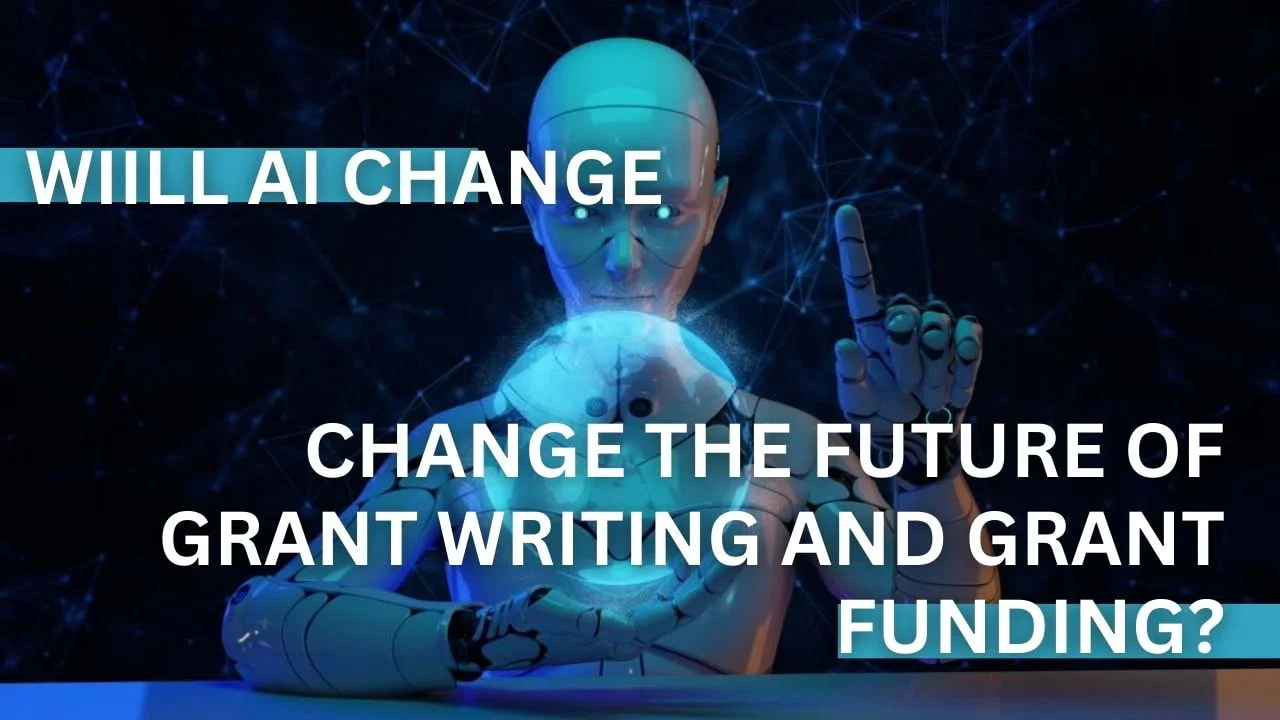
Artificial Intelligence (AI) holds significant potential to transform the future of grant writing and funding. Here are some ways it could bring about change:
-
Increasing Opportunities: AI can help increase opportunities by identifying suitable grants for organizations based on their needs and objectives. This ensures that no potential funding opportunity is missed.
-
Reducing Barriers: AI can make the grant application process more accessible by automating many of the routine tasks involved in grant writing, such as data collection and proposal formatting2. This reduces barriers to accessing grant funding, particularly for smaller organizations with limited resources.
-
Enhancing Proposal Quality: AI can analyze large volumes of data to highlight factors that contribute to successful outcomes3. This allows grant writers to refine their strategies and improve the quality of their proposals.
-
Improving Efficiency: AI can streamline the grant writing process, making it faster and more efficient. This includes automating tasks such as copying and pasting sections for grants thus allowing grant writers to focus more on strategic aspects of their work.
-
Promoting Collaboration: The future of grant writing will likely involve a combination of human expertise and AI capabilities. AI tools can handle data-intensive tasks, while humans can provide the strategic insight and personal touch required for a compelling grant proposal.
-
Enhancing Reporting: AI can also play a role in improving reporting processes by analyzing participant data and highlighting key outcomes. This can help organizations demonstrate the impact of their work more effectively.
In conclusion, while AI is unlikely to replace professional grant writers entirely, it can significantly enhance their work by automating routine tasks, providing valuable insights, and improving the overall efficiency and effectiveness of the grant writing project budget and process.
What steps should one take to incorporate AI into their grant writing process?
Incorporating AI into the grant writing process can streamline tasks, improve efficiency, and provide valuable insights. Here are some steps to consider:
-
Understanding the Basics of AI: Before incorporating AI, it's crucial to understand its capabilities and limitations. This includes knowledge about machine learning, natural language processing, and other relevant technologies.
-
Identify Areas for AI Integration: Determine which parts of your grant writing process could benefit from AI integration. This could be data collection, proposal drafting, editing, proofreading, or even predicting success rates based on historical data.
-
Choose the Right Tools: There are numerous AI tools available, each with different features. Identify the ones that best suit your needs. Tools like Grantable and Fluent.ai offer features specifically designed for grant writing.
-
Training and Implementation: Ensure your team is properly trained to use these tools. Implement the tools in a phased manner, starting with non-critical tasks before moving onto more complex ones.
-
Analyze and Refine: After implementation, regularly review the results and refine your approach. AI is a rapidly evolving field, and staying updated with new developments can help you leverage it more effectively.
Remember, while AI can enhance the grant writing process, it doesn't replace human insight and expertise. AI should be used as a tool to augment, not replace, the skills of a grant writer.
Can AI be used to predict the success rate of grant proposals?

Yes, AI can be used to predict the success rate of grant proposals. Several studies and applications have demonstrated this potential.
In a study published on Springer, researchers aimed to use machine learning algorithms to predict the success of a project based on data from the funding proposal. Similarly, an article on Grant Professionals discusses how AI can identify factors leading to successful outcomes by analyzing participant data, thereby enabling grant writers to refine their strategies.
Another literature review conducted at the University of Twente evaluated proposals on how AI could be used in project management, including predicting the success of grant proposals.
Research shared on LinkedIn also highlighted how AI models can generate well-structured, persuasive, and tailored proposals, potentially enhancing their chances of success.
Additionally, Jeremy Howard, a renowned data scientist, used machine learning to identify groups with high or low application success rates, indicating strong predictors for grant application outcomes.
In conclusion, while AI can't guarantee the success of a grant proposal, it can analyze historical data, identify patterns, and provide insights that may increase the chances of success.
How does AI help in personalizing grant proposals for different funders?

AI can significantly aid in personalizing grant proposals for different funders. It achieves this by generating well-structured, persuasive, and tailored proposals that align with the specific goals and preferences of various funders.
Several AI-driven tools have been developed to streamline the grant writing process. These tools can turn project ideas and objectives into detailed and compelling grant proposals. They also provide resources, support, and guidance to help nonprofit organizations personalize their proposals to fit the interests and requirements of different funding bodies.
Furthermore, AI can automate tasks, improving accuracy and efficiency in the grant writing process. This allows grant writers to focus more on the unique aspects of their proposals, ensuring they resonate with the specific funders they are targeting.
AI-assisted application screening can also help build trust in the grantmaker's decision-making process, encouraging applicants to continue seeking funding opportunities.
Can AI be used to automate some aspects of grant writing?

Indeed, AI can be utilized particular grant, to automate certain aspects of grant writing. For instance, it's capable of handling repetitive tasks such as formatting, which allows human grant writers to focus more on strategic components. There are also AI-powered services available that offer free or low-cost grant application writing.
AI tools can also be used to quickly gather and analyze large amounts of data, helping to uncover relevant statistics and previous grant information. They can automatically create and manage grant proposals, applications, and reports with precision and accuracy. This can be particularly helpful for nonprofit grants and for small teams with limited resources.
However, while AI can automate certain tasks, it cannot replicate the unique perspectives, critical thinking, and creativity that human grant writers bring to the table. Therefore, a combination of AI automation and human expertise can often yield the best results in grant writing.
Is AI changing the skill set required for successful grant writing?
Yes, the advent of AI is indeed shifting the necessary skills for successful grant writing. AI's rapid advancement is altering the landscape of traditional roles within government agencies, including technical and grant writing a grant proposal
AI can process large volumes of data and highlight factors contributing to successful outcomes, which can help grant writers refine their strategies to seek funding. Therefore, grant writers may need to develop skills in interpreting and applying insights generated by AI tools.
However, AI cannot fully replace the nuanced understanding and adaptability of human grant writers. They can perceive subtle changes in funding agency and evaluation criteria and adjust their approach accordingly, a quality currently beyond the reach of AI. Grant writing still requires human input for a well-researched and thoughtful proposal.
To future-proof their skills, grant writers might need to learn how to effectively use AI tools, interpret their output, and integrate these insights into their proposals while maintaining their traditional writing and research skills.
Conclusion
In conclusion, the integration of Artificial Intelligence into the grant writing process heralds a new era in the quest for funding. As we've discussed in this blog, AI can streamline tasks, enhance productivity, and provide invaluable insights that can significantly improve the success rates of grant proposals.
-
However, it's important to remember that AI is a tool, not a substitute for human expertise and intuition. While AI can help with data analysis, drafting, editing, and proofreading, the art of crafting a compelling narrative that resonates with funders still lies in the hands of skilled grant writers.
By understanding the potential of AI and how to effectively incorporate it into the grant writing process, organizations can leverage this technology to their advantage. Whether it's using machine learning algorithms to predict success rates or AI-powered tools to draft persuasive proposals, the modern approach to grant writing is becoming increasingly digital.
The future of grant writing is here, and it's powered by AI. Embracing this technology can give your organization a competitive edge, helping you secure the funding needed to make a positive impact on the world. So, start exploring the possibilities today, and take your grant writing process to the next level.

